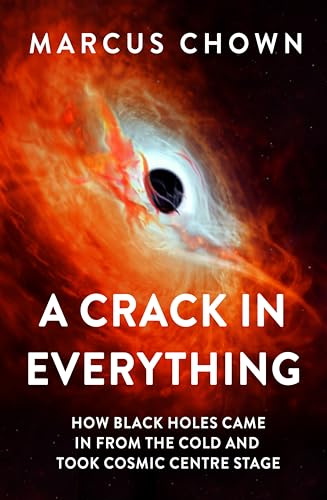I am delighted to share my review today of A Crack in Everything: How Black Holes Came in from the Cold and Took Cosmic Centre Stage by Marcus Chown. I am not an academic and this book looks at the people behind the scenes that understand and complete the science and the maths that is used to understand our place in the vastness of the universe.
My huge thanks to Head of Zeus for granting my request to read this title via NetGalley.

What is space? What is time? Where did the universe come from? The answers to mankind’s most enduring questions may lie in science’s greatest enigma: black holes.
A black hole is a region of space where gravity is so strong that nothing, not even light, can escape. This can occur when a star approaches the end of its life. Unable to generate enough heat to maintain its outer layers, it shrinks catastrophically down to an infinitely dense point.
When this phenomenon was first proposed in 1916, it defied scientific understanding so much that Albert Einstein dismissed it as too ridiculous to be true. But scientists have since proven otherwise. In 1971, Paul Murdin and Louise Webster discovered the first black hole: Cygnus X-1. Later, in the 1990s, astronomers using NASA’s Hubble Space Telescope found that not only do black holes exist, supermassive black holes lie at the heart of almost every galaxy, including our own. It would take another three decades to confirm this phenomenon. On 10 April 2019, a team of astronomers made history by producing the first image of a black hole.
A Crack in Everything is the story of how black holes came in from the cold and took cosmic centre stage. As a journalist, Marcus Chown interviews many of the scientists who made the key discoveries, and, as a former physicist, he translates the most esoteric of science into everyday language. The result is a uniquely engaging page-turner that tells one of the great untold stories in modern science.
MY REVIEW
I do like science, space and things that make no sense to me! I am not a science-brained person and I cannot get my head around so many things that fall into these sorts of categories. So, why on earth would I even bother trying to read books that are beyond me? Well, it is not in the hope that I will have some miraculous bolt of lightning that gives me the ability to understand these things. I read them because they make me know that people, especially me, are just a minute part of something so vast. It also makes me appreciate those people who do have the ability to understand the maths, the science and what makes things work.
This book, yes is about Black Holes, the Universe, Quantum Physics, unfathomable numbers and unimaginable equations, but it is about those special individuals that that do understand them.
This book does have maths and science as you would expect, but the author brings to the forefront the people who make the connections and can do the maths that is required to understand the larger side of our life, planet and our place within the universe.
Einstein is mentioned but I don’t understand his famous E=mc² theory, I know it is part of an equation that is his well-known theory of relativity, that it was an evolutionary step forward and it has to do with nuclear fusion. this relates to black holes. While I am reading about the dynamics I can understand the basic concept, but I would not attempt to even explain it.
This book though does make sense while reading and it is interesting to read about those people in the world that can see through the confusion. These people are introduced and referenced over the 10 chapters of the book. I am not an academic, so I am not aware of them or what they have done. I think that is quite sad really.
So this book discusses those behind science and maths that help people to understand science and maths. It was indcrediblyy interesting but also took me quite some time to read through. I did like to sit and read this gradually over the course of a couple of weeks.
This is a readable book, but it does contain things that were beyond my understanding, this did not put me off as I do think it helped me understand a bit more. So in that respect it is a good book. Is it one for the academics, I really don’t know you will have to look for their reviews, but the ones I have seen do recommend it and praise it well.
I am happy to recommend this book and would recommend it to anyone who is curious, wants to know more or is a fan of non-fiction, mathematics, space, science and popular science books.
Many thnask for reading my post, a like or share would be amazing 🙂 xx

